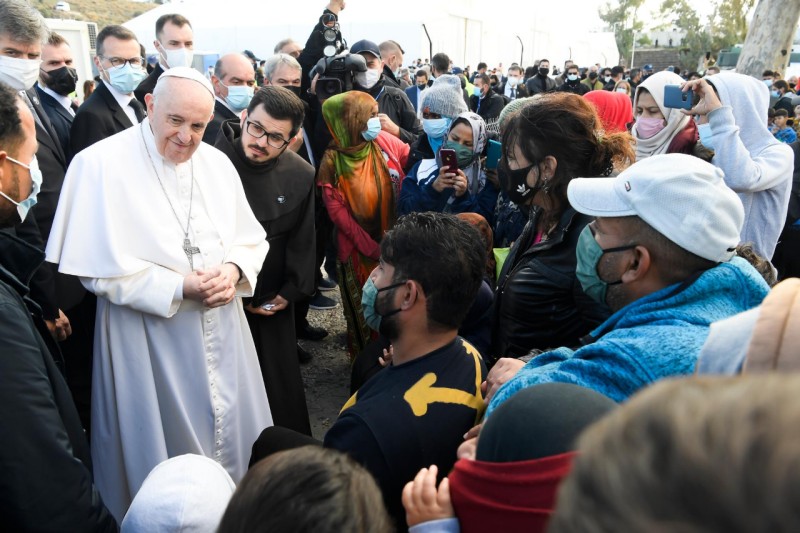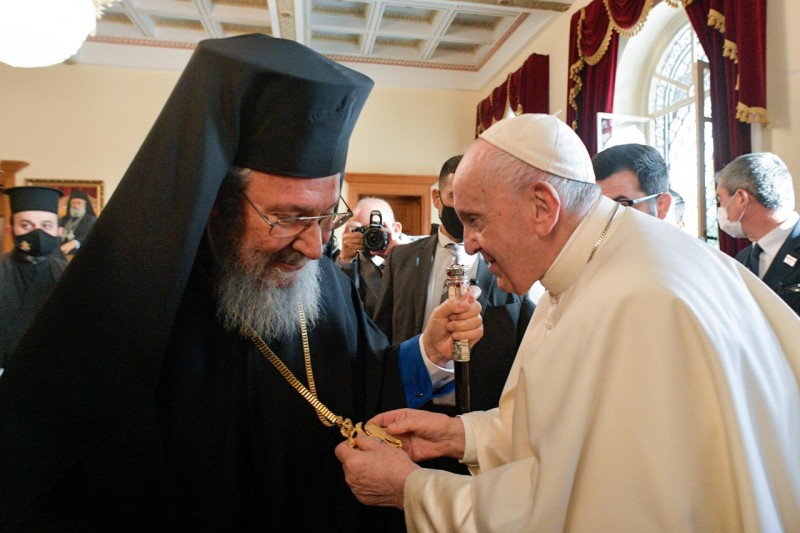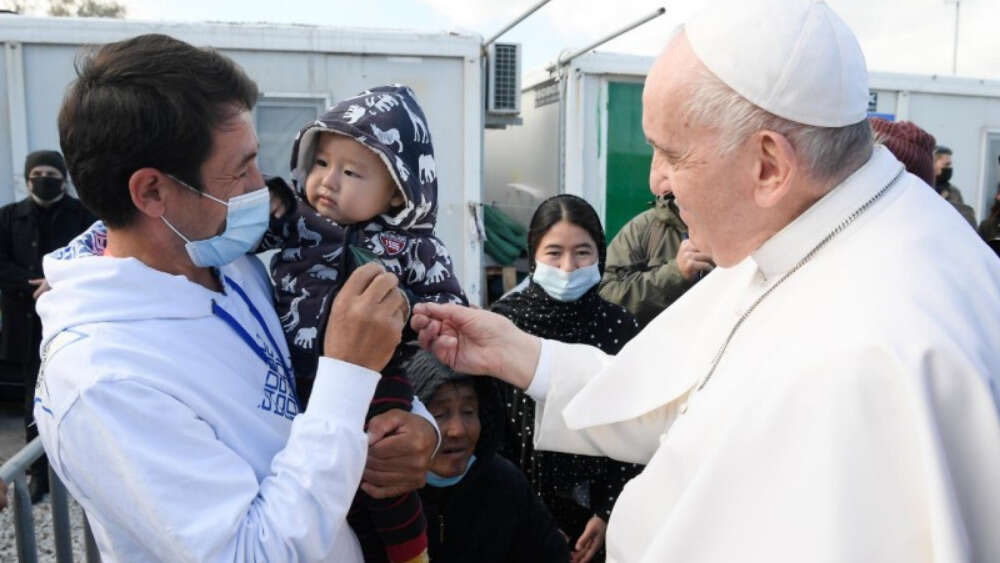Pope Francis issues passionate plea for coordinated response to refugees
“This ‘becoming used’ to things is a grave illness, a very grave illness, and there is no antibiotic for it!”
Pope Francis has strongly condemned the world’s response to refugees during a visit to a refugee camp in Mytilene on the Greek Island of Lesbos, calling for a coordinated global effort to address the crisis.
“It is an issue for the whole world: a humanitarian crisis that concerns everyone,” the Pope said.
Francis said that the pandemic had a global impact of making all humans realise “we are all in the same boat” and “experience what it means to have identical fears”.
“We have come to understand that the great issues must be faced together, since in today’s world piecemeal solutions are inadequate. Yet while we are working to vaccinate people worldwide and, despite many delays and hesitations, progress is being made in the fight against climate change, all this seems to be terribly absent when it comes to migration. Yet human lives, real people, are at stake!” he said.
It was Francis’ second visit to the camp, having visited in April 2016 and delivered a message urging refugees not to lose hope, even in their suffering.

Pope Francis at a refugee camp in Mytilene, Lesbos, Greece The Vatican
This visit, having found very little unchanged at the camp – despite the valiant efforts of locals, volunteers, and political and other leaders whom he acknowledged in his address. So, the Catholic leader did not hold back his frustration or temper his critique.
“History teaches us that narrow self-interest and nationalism lead to disastrous consequences,” he said. “It is an illusion to think it is enough to keep ourselves safe, to defend ourselves from those in greater need who knock at our door. In the future, we will have more contact with others. To turn it to the good, what is needed are not unilateral actions but wide-ranging policies.”
“Let us stop ignoring reality, stop constantly shifting responsibility, stop passing off the issue of migration to others, as if it mattered to no one and was only a pointless burden to be shouldered by someone else!”
Francis condemned what he described as “the age of walls and barbed wire”, taking a shot at Europe, which he said is “constantly promoting” the values of respect for individuals and human rights, yet has not addressed the conditions “unfit for human beings” faced by refugees.
“To be sure, we can appreciate people’s fears and insecurities, the difficulties and dangers involved, and the general sense of fatigue and frustration, exacerbated by the economic and pandemic crises. Yet problems are not resolved and coexistence improved by building walls higher, but by joining forces to care for others according to the concrete possibilities of each and in respect for the law, always giving primacy to the inalienable value of the life of every human being,” he said.
Francis said it is easy to “stir up public opinion by instilling fear of others” but that confronting the issue of displaced peoples needed to begin with reality, not “bickering over ideas”.
“The remote causes should be attacked, not the poor people who pay the consequences and are even used for political propaganda. To remove the root causes, more is needed than merely patching up emergency situations. Coordinated actions are needed. Epochal changes have to be approached with a breadth of vision. There are no easy answers to complex problems; instead, we need to accompany processes from within, to overcome ghettoisation and foster a slow and necessary integration, to accept the cultures and traditions of others in a fraternal and responsible way.”
Francis spoke of the Mediterranean sea – a motif he has referred to often in this visit to Cyrus and Greece – saying that it had brought different peoples and distant lands together for millennia but now was becoming “a grim cemetery without tombstones”.
Just two days earlier, Francis had met with refugees to pray at the parish Church of the Holy Cross in Nicosia, the divided capital of Cyprus. The papal leader passionately lamented the apathy that characterised the global response to refugees.
“We see what is happening, and the worst thing is we are becoming used to it. “Oh yes, today another boat capsized… so many lives were lost…” This “becoming used” to things is a grave illness, a very grave illness, and there is no antibiotic for it!” he said.
“… Our sinfulness leads us to think: “Those poor people, those poor people!” and with those words, “poor people”, we blot everything out.”
Francis has touched on the issue of refugees in almost every speech he has given on the trip, even those with Orthodox Church leaders. Francis’ visit to Athens is the first by a Pope since John Paul II’s in 2001, the first papal visit to Nicosia since the Schism between the Catholic and Orthodox Churches in 1054.
In speeches delivered to Orthodox church leaders, Francis extolled the same virtues he wanted to see in response to refugees – hospitality, generosity, humility and a sense of commonality. This time, though, Francis called for them in the Church’s response to other Christians and non-Christians alike.
“The face of the Church reflects Cyprus’ own place in the European continent: it is a land of golden fields, an island caressed by the waves of the sea, but above all else a history of intertwined peoples, a mosaic of encounters,” Francis told Bishops, priests and other Cypriot Orthodox leaders at Maronite Cathedral of Our lady of Grace in Nicosia on Thursday.

Pope Francis greets Cypriot Orthodox leaders at Orthodox Cathedral in Nicosia, Cyprus.
“The Church, as catholic, universal, is an open space in which all are welcomed and gathered by God’s mercy and invitation to love. Walls do not and should not exist in the Catholic Church. Let us never forget that!” he said.
Drawing on the example of the biblical character Barnabas, Francis highlighted the relationship of fraternity the apostle had with Paul.
“Brothers can argue and at times fight,” Francis said. “They argued, yet from some later letters of Paul, we see there is no rancour between them,” Francis said. “…Fraternity in the Church means that we can argue about visions, perceptions, differing ideas, and certain cases… Yet let us always remember: we argue not for the sake of fighting or imposing our own ideas, but in order to live the vitality of the Spirit who is love and communion. We may argue, yet we remain brothers and sisters.”
Francis spoke similarly of his shared “apostolic roots” with Greek Orthodox leaders at the “Throne Room” of the Orthodox Archbishopric of Greece in Athens on Saturday.
“Those roots, growing from the seed of the Gospel, began to bear abundant fruit precisely in Hellenic culture: I think of the early Fathers of the Church and the first great ecumenical councils.
Tragically, in later times we grew apart. Worldly concerns poisoned us, weeds of suspicion increased our distance and we ceased to nurture communion,” Francis went on. “Shamefully – I acknowledge this for the Catholic Church – actions and decisions that had little or nothing to do with Jesus and the Gospel, but were instead marked by a thirst for advantage and power, gravely weakened our communion. In this way, we let fruitfulness be compromised by division.”
“History makes its weight felt, and here, today, I feel the need to ask anew for the forgiveness of God and of our brothers and sisters for the mistakes committed by many Catholics. Yet we are comforted by the certainty that our roots are apostolic and that, notwithstanding the twists and turns of time, what God planted continues to grow and bear fruit in the same Spirit. It is a grace to recognise one another’s good fruits and to join in thanking the Lord for this.”
Make a Donation
Eternity is pleased to invite you to take part in our special Giving to Eternity appeal.
We passionately believe the good news of what God is doing in the world should be freely available to everyone – Christian and non-Christians alike. In fact, we think the world needs it more than ever before.
We need stories like:
– Singing, praying, Bible-reading church-boy’s NSW Blues State of Origin debut
– Senior Australian of the year shares ‘the deep spring within her’ – Jesus
– Leila Abdallah: ‘If it wasn’t for my faith, I wouldn’t be standing where I am today”
– Staring death in the face, Ben Shaw launches book to make you reconsider.
There is seriously good news to be told and our world deserves to hear it. So, yes, we are very pleased to invite you to take part in telling the good news of what God is doing right now.
You can donate here or check out more of our top stories from 2021.



